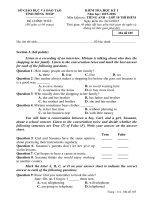TIENG ANH 10 THI DIEM UNIT
Bạn đang xem bản rút gọn của tài liệu. Xem và tải ngay bản đầy đủ của tài liệu tại đây (297.07 KB, 8 trang )
UNIT 1: FAMILY LIFE
A. VOCABULARY
GETTING STARTED
- household chore
/ˈhaʊshəʊld tʃɔːr/
- prepare
/prɪˈpeər/
- split (the housework)
/split/
= share (the housework)
/∫eə/
- duty
/ˈdjuːti/
- help with
/help/
- divide (+ sth into)
/di’vaid/
- equal
/ˈiːkwəl/
- grocery
/ˈɡrəʊsəri/
- do the heavy lifting
/ du: ðə ˈhevi lɪftɪŋ/
- do the laundry
/du: ðə 'lɔ:ndri/
- do the washing-up
/du: ðə ˌwɒʃɪŋˈʌp/
- take out the rubbish
/teɪk aʊt ðə ˈrʌbɪʃ/
- do household chore
/du: ˈhaʊshəʊld tʃɔːr/
- handle
/ˈhændl/
- be responsible for
/rɪˈspɒnsəbl/
= take charge of (phrasal verb) / teik t∫ɑ:dʒ əv/
- finance
/ˈfaɪnæns/
- homemaker
/’həʊmmeikə/
- breadwinner
/’bredwinǝ/
- anyway = anyhow
/ˈeniweɪ/
- physical strength
/ˈfɪzɪkəl streŋθ/
- instead of = in place of
/ɪnˈsted əv/
- routine
/ruːˈtiːn/
- task
/tɑːsk/
- especially
/ɪˈspeʃəli/
- goods
/ɡʊdz/
SKILLS
Reading
- culture
/ˈkʌltʃər/
- consider
/kənˈsɪdər/
- however
/haʊˈevər/
- help out
- individual
/ˌɪndɪˈvɪdʒuəl/
- relationship
/rɪˈleɪʃənʃɪp/
- psychologist
/saɪˈkɒlədʒɪst/
- realize
/ˈrɪəlaɪz/
- enormous
/ɪˈnɔːməs/
- benefit
/ 'benefit/
- sociable
/ˈsəʊʃəbl/
- tend to V
/tend/
- overall
/ˈəʊvərɔːl/
/ˌəʊvərˈɔːl/
- contribute (+ to)
/kənˈtrɪb.juːt/ /ˈkɒn.trɪ.bjuːt/
- vulnerable
/ˈvʌl.nər.ə.bəl/ /ˈvʌn.rə.bəl/
- divorce
/dɪˈvɔːs/
- work together
/wɜːk təˈɡ.ər/
- create
/kriˈeɪt/
- positive
/ˈpɒz.ə.tɪv/
- atmosphere
/ˈỉt.mə.sfɪər/
(v)
(v)
(v)
(v)
(n)
(v)
(v)
(adj)
(n)
(v)
(v)
(v)
(v)
(v)
(v)
(adj)
(v)
(n)
(n)
(n)
(adv)
(n)
(adv)
(n)
(n)
(adv)
(n)
cơng việc nhà
chuẩn bị
chia sẻ (việc nhà)
chia sẻ (việc nhà)
nhiệm vụ
giúp
phân chia
bình đẳng, cơng bằng
cửa hàng tạp hóa, rau củ
làm cơng việc nặng nhọc
làm việc giặt giũ
làm việc dọn rửa
đổ rác
làm việc nhà
thực hiện, giải quyQết
chịu trách nhiệm
chịu trách nhiệm
tài chính
Người chăm sóc gia đình, người nội trợ
Trụ cột gia đình
dù sao đi nữa
sức khỏe (thể chất)/ khỏe mạnh (thể chất)
thay vì
hoạt động thường ngày
nhiệm vụ
đặc biệt là
hàng hóa
(n)
(v)
(conj)
(v)
(n)
(n)
(n)
(v)
(adj)
(n)
(adj)
(v)
(adj)
(adv)
(v)
(adj)
(v)
(v)
(v)
(adj)
(n)
văn hóa
coi như, cân nhắc
tuy nhiên
giúp
cá nhân, cá thể
mối quan hệ
nhà tâm lý học
nhận ra
to lớn, nhiều
lợi ích
thân thiện
có xu hướng
tổng
đóng góp, góp phần vào
dễ bị tổn hương, dễ bị ảnh hưởng
ly hôn
làm việc cùng nhau
tạo ra, sáng tạo
tích cực, chủ động
mơi trường
- set an example
- be critical (of)
/ˈkrɪt.ɪ.kəl/
Listening – Changing role
- balance
/ˈbæl.əns/
- nurture
/ˈnɜː.tʃər/
- recreation
/ˌrek.riˈeɪ.ʃən/
- chance
/tʃɑːns/
- similar (to)
/ˈsɪm.ɪ.lər/
- equally shared parenting
- role
/rəʊl/
- solution
/səˈluː.ʃən/
- traditional
/ trə'di∫ənl/
= conventional
/ kən'ven∫ənl/
- state
/steɪt/
- situation
/ˌsɪtʃ.uˈeɪ.ʃən/
- result
/rɪˈzʌlt/
Writing “Many hands make light work.”
- mend
/mend/
- take up (phrasal verb)
- fridge
/frɪdʒ/
- include
/ɪnˈkluːd/
- responsibility
/rɪˌspɒn.sɪˈbɪl.ə.ti/
- take turns (idiom)
- lay the table
Speaking: Communication and culture
- communication
/kəˌmjuːnɪˈkeɪʃən/
- culture
/ˈkʌltʃər/
- financial
/fai’nænʃl/
- burden
/‘bз:dn/
- homemaking
/həʊm ˈmeɪkɪŋ /
- take care of (phrasal verb) /teil keə əv/
= look after (phrasal verb)
/lʊk ˈɑːf.tər/
- join hands
- provider
/prəˈvaɪ.dər/
- opinion
/əˈpɪn.jən/
- agree (with sb)
/əˈɡriː/
- perform
/pəˈfɔːm/
- nuclear
/ˈnjuː.klɪər/
- consist of
/kən'sist/
- single-parent
/ˈsɪŋ.ɡəl ˈpeə.rənt/
- child-minder
/tʃaɪld ˈmaɪn.dər/
- nursing home
/ˈnɜː.sɪŋ ˌhəʊm/
- collaborate with
/kəˈlæb.ə.reɪt/
= cooperate
/kəʊˈɒp.ər.eɪt/
- activity
/ækˈtɪv.ə.ti/
- Parent Support Group
- Parent-Teacher Association
- extend
/ɪkˈstend/
- extended
/ɪkˈstendɪd/
- generation
/ˌdʒen.əˈreɪ.ʃən/
- popular
/ˈpɒp.jə.lər/
- on the other hand
- ungrateful
/ʌnˈɡreɪt.fəl/
(v)
(adj)
tạo thành ví dụ
bình luận, chỉ trích
(n)
(v)
(n)
(n)
(adj)
(n)
(n)
(n)
(adj)
(adj)
(n)
(n)
cân bằng, ổn định
ni dưỡng
giải trí
cơ hội
giống, tương đương
chia sẻ trách nhiệm gia đình
vai trị
giải pháp, đáp án
truyền thống
truyền thống
trạng thái, tình trạng
tình huống, tình trạng
(n)
kết quả
(v)
(v)
(n)
(v)
(n)
(v)
(v)
sửa chữa
gánh vác, tiếp tục, đảm nhiệm, lấy…
tủ lạnh
bao gồm
trách nhiệm
theo thứ tự
dọn bàn
(n)
(n)
(adj)
(n)
(n)
(v)
(v)
(v)
giao tiếp
văn hóa
tài chính
gánh nặng
(n)
(v)
(v)
(n)
(v)
(n)
(n)
(n)
(v)
(v)
(n)
(n)
(n)
(v)
(adj)
(n)
(adj)
(adv)
adj)
quan điểm, ý kiến
đồng ý, tán thành
thực hiện
nguyên tử, hạt nhân
bao gồm
cha mẹ đơn thân
người giữ trẻ
viện dưỡng lão
làm việc chung, hợp tác
hợp tác
hoạt động
Nhóm hỗ trợ cha mẹ
Hiệp hội Phụ huyh và Giáo viên
mở rộng
mở rộng
thế hệ
phổ biến
mặt khác
vơ ơn
chăm sóc, trơng nom
chăm sóc
chung tay
- advice
/ədˈvaɪs/
- give the advice on
- behavior
/bɪˈheɪ·vjər/
- housekeeper
/ 'hauski:pə/
- career
/kǝ’riǝ/
- occupation
/,ɒkjʊ'pei∫n/
- encourage (v) + smb + to V / in'kʌridʒ/
# discourge + smb + from + V-ing
- raise
/reɪz/
= bring up
- reduce
/rɪˈdʒuːs/
>< increase
/ɪnˈkriːs/
- security
/sɪˈkjʊə.rə.ti/
>< danger
/ˈdeɪn.dʒər/
- suitable
/ˈsuː.tə.bəl/ /ˈsjuː.tə.bəl/
>< inappropriate
/ˌɪn.əˈprəʊ.pri.ət/
- neat and tidy (idiom)
>< messy and dirty (idiom)
- willingly
/ˈwɪl·ɪŋ·li/
>< reluctantly
/rɪˈlʌk.tənt/
(n)
(v)
(n)
(n)
(n)
(n)
(v)
(v)
(v)
(v)
(v)
(v)
(n)
(n)
(adj)
(adj)
lời khuyên
đưa ra lời khuyên
hành vi
quản gia
Nghề nghiệp, sự nghiệp
Nghề nghiệp, sự nghiệp
khuyến khích ai làm gì
ngăn ai khỏi làm gì
ni dưỡng
ni dưỡng
giảm
tăng
an tồn, an ninh
nguy hiểm, rủi ro
phù hợp
không phù hợp
(n)
sạch sẽ gọn gàng
(n)
bẩn
(adv) sẵn sàng
(adv) lưỡng lự
B. LANGUAGE FOCUS
I. Present simple and present progressive (Thì hiện tại đơn và thì hiện tại tiếp diễn)
thì
Cơng thức
Dấu hiệu
1, Hiện * BE: (+) S + am/ is/ are
every + hour/ day/ week/ month/ year...
tại đơn:
(-) S + am/ is/ are not
always (luôn luôn)
kể
(am not/ isn’t/ aren’t)
often/ usually (thường xuyên)
chuyện,
(?) (Wh-q) + am/is/ are + S?
sometimes/ occasionally (thỉnh thoảng)
thói quen * (V): (+) S + V/Vs, es
seldom/ rarely (hiếm khi)
(-) S + do/does + not + V
never
(don’t/ doesn’t)
once (1 lần)
day
(?) (Wh-q) + do/does +S + V?
twice (2 lần)
+a+
week
number + times
month ...
in the morning/ afternoon/ evening
at night/ on Monday
in the spring/ summer/ autumn/ winter
after school
2, Hiện * (+) S + am/is/are + V-ing
V! (Listen!, Watch!, Look!, Pay attention!)
tại
tiếp
(-) S + am/is/are not + V-ing
now, right now, at the moment, at present (bây
diễn:
(?) (Wh-q) + am/is/are + S + V-ing
giờ)
đang xảy Eg1 : I (go) am going to school now.
today
ra,
bất Eg 2: The students (not, listen) aren’t listening this + morning/ afternoon
thường
to the teacher at the moment.
Eg 3: Look! The baby is crying.
- Khơng dùng thì hiện tại tiếp diễn cho các động từ chỉ nhận thức, tri giác như:
be, see, understand, hear, know, like, want, feel, love, hate, seem, remember, forget…
PRONUNCIATION
/tr/
/kr/
/br/
trash
create
breadwinner
tree
critical
breakfast
train
cream
brown
treat
crane
brother
true
crack
brush
TEXBOOK
GETTING STARTED
Household chore
Nam:
Hello?
Mr Long: Hello Nam? This is Uncle Long. Is your dad there? I’d like to ask him out for a game of tennis.
Nam:
Well, I’m afraid he can’t go out with you now. He’s preparing dinner.
Mr Long: Is he? Where’s your Mum? Doesn’t she cook?
Nam:
Oh, yes. My mum usually does the cooking, but she’s working late today.
Mr Long: How about your sister and you? Do you help with the housework?
Nam:
Yes, we do. In my family, everybody shares the housework duties. Today my sister can’t help with
the cooking. She’s studying for exams.
Mr Long: I see. So how do you divide household chores in your family?
Nam:
Well, both my parents work, so we split the chores equally – my mother cooks and shops for
groceries, my father cleans the house and does the heavy lifting, my sister does all the laundry, and
I do washing-up and take out the rubbish.
Mr Long: Really? It’s different in my family. My wife handles most of the chores around the house and I’m
responsible for the household finances. She’s the homemaker and I’m the breadwinner. Anyway, I
have to go now. Tell your dad I called. Bye.
Nam:
Oh yes, I will. Bye, Uncle Long.
1. Match the words and phrases with their meanings below.
1. chore
2. homemaker
3. breadwinner
4. groceries
5. split
6. laundry
7. heavy lifting
8. washing-up
a. The member of a family who earns the money that the family needs
b. Divide
c. The act of washing the dishes after a meal
d. An action that requires physical strength
e. A person who manages the home and often raises children instead of earning money from a job
f. A routine task, especially a household one
g. Clothes washing
h. Food and other goods sold at a shop or a supermarket
Reading
Sharing housework
1. Read the text below and decide which of the following sentences is the best title for it.
a. Doing Housework is good for Children.
b. Husbands Who Share Housework Make Their Wives Happy
c. Sharing Housework Makes the Family Happier
In many cultures, doing housework is considered a woman’s duty. The mother is usually the homemaker who
has to do most of the household chores, while the father is the breadwinner, who is responsible for the family
finances. However, it is not good for the mother when the rest of the family does not help out. When families
share household chores, it is good for them as individuals and good for all the relationships within the family.
According to psychologists, most people do not realise the enormous benefits that come to a family when
husbands and children share the housework. Children who share the housework with their mums and dads do
better at school, become more sociable, and have better relationships with their teachers and friends. They
learn good skills, are more responsible, and tend to be overall good people. When men share the housework,
they tend to have better relationships with their wives. Women often feel happy when they see their husbands
doing housework because it says, ‘He cares about me and he doesn’t want to put all of the housework on me.’
Women whose husbands do not contribute to the household chores are more vulnerable to illness and tend to
think more about divorce.
When everyone works together on household chores, it creates a positive atmosphere for the family and sets a
good example for the children. This is especially true if mum and dad can find a way to work well together and
are not critical of each other.
2. Read the text again. Do you understand the words from the context? Tick the appropriate meaning
for each word from the text.
1. Sociable
a. friendly
b. unfriendly
2. vulnerable
a. able to be well protected
b. able to be easily physically, emotionally, or mentally hurt.
3. critical
a. saying that something is good
a. saying that something is bad
4. enormous
a. not very large
b. very very large
5. tend
a. likely to behave in a particular way
b. unlikely to behave in a particular way
3 a. What does ‘it’ in line 11 mean …?
A. Women feeling happy
B. Women seeing their husbands doing the housework
C. The husbands doing housework
b. What does ‘it’ in line 14 mean…?
A. A good example for children
B. Everyone working together in the house
C. A positive family atmosphere
5. Answer the questions.
1. How do children benefit from sharing housework?
2. Why do men tend to have better relationships with their wives when they share housework?
3. What may happen to women whose husbands do not contribute to the household chores?
4. How does the family benefit when everyone works together on household chores?
6. Discuss with a partner.
1. Do you have any problems with sharing housework?
2. What benefits do you get when sharing housework?
SPEAKING
Chores I like!
1. Which household chores do you like doing and which do you dislike? Write the answers to the
questions in the table below and add a reason.
Likes
Dislikes
Name of chore
Reason
Name of chore
reason
Cooking
I like eating
Cleaning the bathroom
It’s dirty
2. Below is part of Anna’s interview with Mai. They are talking about the household chores Mai likes
and dislikes. Match Mai’s answers with Anna questions. Then practice the dialogue.
Anna
Mai
1. What household chores do you do every day?
a. Well, I think I like sweeping the house.
2. Which of the chores do you like doing most?
b. Washing the dishes because I often break things
when I do the washing-up.
3. What do you like about it?
c. I do the laundry, wash the dishes, and sweep the
house. I sometimes do the cooking when my mum is
busy.
4. Which of the chores do you dislike doing the most? d. It’s not too hard, and I like seeing the house clean
after I sweep it.
3. Have a similar conversation with a partner. Find out which chores she/he likes or dislikes the most
and why. Report to the class about your partner’s likes and dislikes.
LISTENING
Family life – Changing roles
1. Listen to a family expert talking about how the roles of men and women in families have changed and
decide whether the following statements are true (T) or false (T)
T
F
1. Men’s and women’s roles in the family have become similar.
2. Both men and women now work to contribute to the family finances.
3. According to “equally shared parenting”, both men and women have equal chances for
recreation.
4. According to “equally parenting”, the husband’s career is less important than the wife’s.
5. Families following “equally shared parenting” are happier.
2. Work in pairs. Match the word/phrase with its appropriate meaning.
1. balance
a. a way of solving a problem or dealing with a difficult situation.
2. nurture
b. to care for and protect somebody/something while they are growing and developing
3. equally shared
c. sharing housework and childcare evenly
parenting
4. traditional
d. existing for a long time
5. solution
e. a state where things are of equal weight or force
3. Listen again and answer the questions.
1. How has the role of men in the family changed?
2. How have men’s and women’s roles become alike?
3. What is the result of “equally shared parenting”
WRITING
“Many hands make light work.”
1. Work in pairs. Discuss the meaning of the saying above. Do you agree with it? How does this saying
apply to doing housework in the family?
2. Read the text about Lam’s below and answer the questions
I live in a family of four: my parents, my younger sister and I. We are all very busy people: both my parents
work, and my sister and I spend most of our time at school, so we all split the household chores equally.
My Dad is responsible for mending things around the house. He also cleans the bathroom twice a week. My
mum does most of the cooking and grocery shopping.
Being the elder child in the family, I take up a large share of housework. I do the laundry, take out the rubbish,
and clean the fridge once a week. My younger sister An’s responsibilities include: helping Mum prepare meals
and washing the dishes. My sister and I take turns laying the table for meals, sweeping the house, and feeding
the cat.
We do our share of housework willingly as we know that if everyone contributes, the burden is less and
everyone can have some time to relax.
1. How many people are there in Lam’s family?
2. Why are the people very busy?
3. How do they split the housework in the family?
4. What household chores does each member of the family do?
5. Do the family members enjoy the housework?
6. What are the benefits of everyone in the family sharing the housework?
COMMUNICATION AND CULTURE
Communication
Discussion
Who does what in your family?
2. Listen to the TV talk show. Who said what?
1. Mr Pham Hoang __________________________________________________________________
__________________________________________________________________________________
2. Mr Nguyen Nam __________________________________________________________________
__________________________________________________________________________________
3. Ms Mai Lan ______________________________________________________________________
__________________________________________________________________________________
a. Women also work to share the household financial burden with their husbands.
b. Homemaking can’t only be the job of the wife.
c. A woman’s job is to look after everybody in the family and take care of the house.
d. Both husband and wife should join hands to provide for the family and to make it happy.
e. In the family, the husband is the provider.
f. Women’s roles have changed.
g. When the house is clean and neat, the family is happy.
3. Work in groups. Discuss the questions. Then, report your group’s opinions to the class.
1. Whose opinion do you agree with?
2. What do you think the roles of the wife and the husband should be? Give reason(s) for your oipinion.
3. What roles do your mother and father perform in the family?
4. Are your mother and father happy about their roles? Why? / Why not?
Culture
Read the two about family life in Singapore and in Viet Nam and answer the questions.
Singapore
In Singapore today, people tend to live in nuclear families which consist of parents and children. Families in
Singapore are getting smaller. Many children even grow up in single-parent homes. In most Singaporean
families, both parents work. Very young children go to nursery schools or stay home with a child-minder. Old
people usually live in their own homes or nursing home if they cannot look after themselves. Singaporean
parents try to spend their free time collaborating with the activities of Parent Support Group or a Parent
Teacher Association.
Viet Nam
The extended family, which consists of three or even four generations, great grandparents, grandparents,
parents and children, is still very popular in Viet Nam. In most Vietnamese families, when both parents work,
young children stay home and are looked after by their grandparents or great-grandparents. On the other hand,
it is the duty of the young people to take care of their elderly parents. A person will be considered ungrateful if
he / she does not take care of his / her parents or grandparents. Vietnamese parents often spend their free time
helping their children with their homework or giving them advice on behaviour.
Answers
Questions
In Singapore
In Viet Nam
1
2
3
4
What type of family is popular in the country?
Who takes care of young children when their
parents are at work?
Who looks after elderly parents?
How do the parents contribute to educating their
children?
Toàn bộ từ vựng ngữ pháp bài tập Anh 10, 11, 12 (từ vựng từng phần riêng biệt, bài tập từng unit, ngữ pháp
theo từng unit có bài tập đi kèm) – bản word - có đáp án chi tiết cho tất cả, fee: 200k, các thầy cô quan tâm vui
lịng liên hệ gmail:
Cảm ơn các thầy cơ đã quan tâm
LOOKING BACK
Pronunciation
1. Listen and underline the words that have the consonant cluster sounds /tr-/, /br-/, and /kr-/. Write /tr-/
or /br-/ and /kr-/ above the word that has the corresponding consonant cluster sound. Then, practise
reading the sentences.
1. After having the ice cream, she brushed her teeth.
2. The car crashed into a tree near the traffic lights.
3. Try this new dish created by your brother.
4. They often have brown bread at breakfast.
5. That brave young man likes travelling by train.
6. Is it true that crime is increasing?
Vocabulary
1. Use the words/phrases in the box in their correct form to complete the text.
do the washing-up
take out the rubbish
do the heavy lifting
ironing
laundry
shop for groceries
do the cooking
lay the table
sweeping the floor/house
Household chores are divided equally among the members of Thanh’s family. His mother (1) ___________.
Thanh’s father and sister enjoy the food she cooks very much. Besides, she often (2) _______________
because she wants to choose the freshest and healthiest ingredients for the meals. Thanh’s father is a strong
man but he doesn’t have much time for housework. So he only (3) ___________________ that requires
physical strength. Thanh helps with (4) _______________________ and (5) _____________________. He
feels happy to see his parents wearing clean and neat clothes to work. Although he doesn’t really like it
because he thinks it’s dirty, he (6) __________________ every day. Thanh’s sister contributes by (7)
__________________. She does it very carefully so the house is always very clean. Before each meal, she (8)
______________, and after the meal, Thanh (9) _________________. Sometimes, he breaks a bowl or a plate.
Everybody in the family shares the housework so that all can have some time for rest and recreation.
PROJECT
1. Do a survey. Find out …
How many classmates livein a nuclear family and how many live in an extended family.
How many classmates have both parents working
How many classmates spend at least one hour per day doing housework
How many classmates have parents who spend at least one hour a day helping them with their
homework
What your classmates think the ideal family is like
2. Work in groups. Compare your findings and get ready to report to the class.
Now you can
Use words/phrases about household chores
Use the present simple and the present progressive
Exchange opinions about household chores
Write about doing household chores in your family
…………………………………………………………………………………………………………………….
…………………………………………………………………………………………………………………….
…………………………………………………………………………………………………………………….









